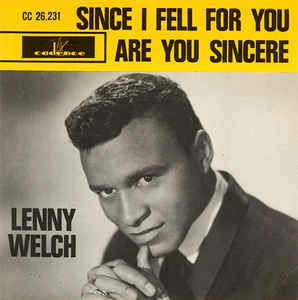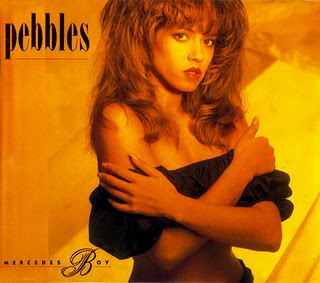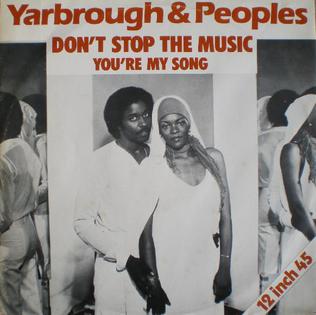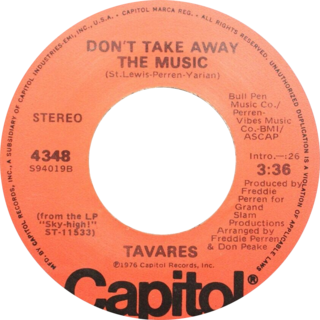Related Research Articles

"Since I Fell for You" is a blues ballad composed by Buddy Johnson in 1945 that was first popularized by his sister, Ella Johnson, with Buddy Johnson and His Orchestra.

"Mercedes Boy" is a song by American singer Pebbles from her 1987 self-titled debut studio album. The song was written by the singer and produced by Charlie Wilson, with additional production from Pebbles. "Mercedes Boy" was released as the album's second single on March 7, 1988, by the MCA label.

"Don't Stop the Music" is a song by Yarbrough and Peoples, from the duo's 1980 debut album, The Two of Us. It was released as a single on Mercury Records in 1980.

"Take Your Time (Do It Right)" is the debut single by American R&B group the S.O.S. Band. It was released as the lead single from their debut studio album, S.O.S. (1980) on March 18, 1980 through Tabu Records, three months before the album's release.
"It's Ecstasy When You Lay Down Next to Me" is a hit song by American singer Barry White. The song was written by Ekundayo Paris and Nelson Pigford, and arranged by Barry White.

"I'll Be Good to You" is a 1976 hit song by R&B duo the Brothers Johnson. George Johnson, one of the two Johnson brothers in the band, wrote the song after deciding to commit to a relationship with one woman, instead of dating several at a time. While George was recording a demo for the song, family friend Senora Sam came by and added some lyrics. Brothers Johnson producer and mentor Quincy Jones heard the song, liked it, and convinced George to sing lead on the finished track. Released from their debut album, Look Out for #1, it was a top-ten hit on the Billboard Hot Singles Charts, peaking at number three, and a number one song on the Billboard R&B Charts during the summer of 1976. The single was later certified gold by the RIAA.

"Do It ('Til You're Satisfied)" is a popular song by funk group B. T. Express, written by songwriter Billy Nichols.

"I'm Still in Love with You" is a song originally recorded by Al Green. Released from the album of the same title, the single spent two weeks at #1 on the Hot Soul Singles chart in August 1972. It also peaked at #3 on the Billboard Hot 100 singles chart that same year. It would eventually sell over one million copies and is considered one of his most popular songs. Billboard ranked it as the No. 59 song for 1972.
Ronald Dyson was an American soul and R&B singer and actor.
"Do You Love What You Feel" is a soul/disco song by Rufus and Chaka.
"Happy People" is a 1974 single by The Temptations, co-written by Lionel Richie. It was the first single from the A Song For You album. In the United States, the single went to #1 on the R&B chart and #40 on the Billboard Hot 100 singles chart. "Happy People" also peaked at #11 on the disco/dance chart. The single was the first Temptations release without the guidance of Norman Whitfield since 1966.

"Hi-Jack" is a 1974 r&b and funk disco based song written by Spanish musician Fernando Arbex and originally recorded by his group Barrabás for their album ¡Soltad a Barrabás!. While their version of the song was a huge success in their native Spain, going all the way to Number one over there, the song flopped in America, stalling at just number No. 104 on the Bubbling Under the Billboard Hot 100 Charts in July 1975. It was later a hit single for jazz flautist Herbie Mann.

"The Best Disco in Town" is a 1976 crossover disco single by Philadelphia-based group, The Ritchie Family. In the United States, the single was a top 20 hit on both the soul and pop charts. "The Best Disco in Town" went to number one for one week on the disco/dance chart.
"Do What You Wanna Do" is the debut 1977 single by Nassau, Bahamas based group, T-Connection. The single reached number one on the disco/dance chart in the US for seven weeks. The single made it to #15 on the soul charts and peaked at #46 on the US pop chart.
"Quiet Village" is an orchestral pop instrumental that was written and originally performed by Les Baxter in 1951 and an instrumental album from 1959 by Martin Denny. In the liner notes to his album, Ritual of the Savage , Baxter described the themes he was conveying in the work:
[t]he jungle grows more dense as the river boat slowly makes its way into the deep interior. A snake slithers into the water, flushing a brilliantly plumaged bird who soars into the clearing above a quiet village. Here is a musical portrait of a tropical village deserted in the mid-day heat.

"Keep on Dancin'" is a 1979 single by Gary's Gang, a disco group, from Queens, New York. Their debut release of "Keep on Dancin'" was their most successful.
"Glasshouse" is a 1975 R&B single by The Temptations. It was written by Motown songwriting team Charlemagne, which consisted of James Carmichael, Ronald Miller and Kathy Wakefield. The song appeared on the album A Song for You. It was the last top forty hit for The Temptations, going to number thirty-seven pop and number nine on the R&B charts. "Glasshouse" also peaked in the top ten on the US Disco chart.

"Two Hearts'" is a hit duet sung by American R&B singers Stephanie Mills and Teddy Pendergrass, from Mills' fifth studio album Stephanie (1981). The song was written and produced by James Mtume, Reggie Lucas and Tawatha Agee. Released in January 1981, the single reached number 40 on the US Billboard Hot 100 in 1981. On the US Billboard R&B chart, "Two Hearts" reached number three.
"Who Is He?" is a track from Bill Withers' 1972 album, Still Bill. The music was written by Withers along with Stan McKenny, who wrote the lyrics. The song has also been featured on the soundtrack of Quentin Tarantino's Jackie Brown.

"Don't Take Away the Music" is a hit song by R&B/disco group Tavares, released in the fall of 1976. It peaked at number 34 on the US Billboard Hot 100 singles chart and at number four in the UK. Along with the track "Heaven Must Be Missing an Angel", the song spent two weeks at number 1 on the Hot Dance Club Play chart.
References
- ↑ " Do It Any Way You Wanna " at Discogs
- ↑ Whitburn, Joel (2004). Top R&B/Hip-Hop Singles: 1942-2004. Record Research. p. 456.
- ↑ Whitburn, Joel (2004). Hot Dance/Disco: 1974-2003. Record Research. p. 201.